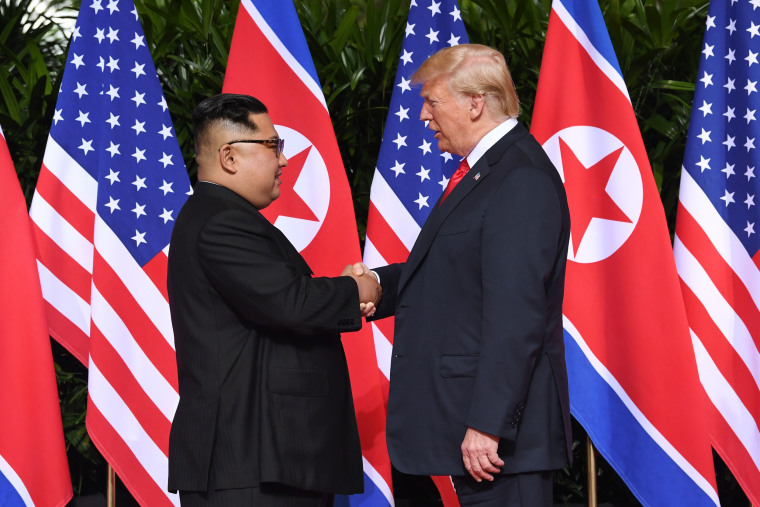Nearly every aspect of Donald Trump's presidency carries with it a degree of incompetence and absurdity, but the Republican's handling of North Korean sanctions is qualitatively different from the routine day-to-day madness we're accustomed to seeing around this White House.
The story began five days ago in a wholly uninteresting way: White House National Security Advisor John Bolton and Treasury Secretary Steven Mnuchin separately touted new economic sanctions that United States was imposing on North Korea in response to the rogue nuclear power's illicit shipping practices.
Just 24 hours later, however, Trump declared via Twitter, "It was announced today by the U.S. Treasury that additional large scale Sanctions would be added to those already existing Sanctions on North Korea. I have today ordered the withdrawal of those additional Sanctions!"
It wasn't at all clear what he was talking about -- there were no new sanctions unveiled on Friday -- and many assumed the president was referring to the sanctions unveiled a day earlier.
White House Press Secretary Sarah Huckabee Sanders made no effort to dissuade anyone from thinking that, and told reporters that Trump overruled his own team, and offered North Korea the latest in a series of unilateral concessions, because he "likes Chairman Kim."
Several hours later, administration officials started telling reporters that Trump wasn't actually tweeting about the new sanctions, but rather, he was referring to "a future round of previously unknown sanctions scheduled for the coming days." The Washington Post's report on this added, "The confusion created by policy differences inside the administration was compounded by the president's imprecise tweet."
By that point. administration officials, blindsided and confused, had no idea how, or whether, to follow the president's published instructions.
All of this, of course, made the White House look completely inept, but the bungling may have been worse than originally feared. Bloomberg News reported this morning:
The president in fact intended to remove penalties Treasury had announced the day before against two Chinese shippers that had helped Pyongyang evade U.S. sanctions, according to five people familiar with the matter. Trump hadn't signed off on the specific measures before they were announced but had given Treasury discretion to decide some sanctions as it saw fit, according to one person familiar with the matter. [...]There were no additional North Korea sanctions in the works at the time, according to two people familiar with the matter.
Oh my.
If the Bloomberg News report is correct -- it has not been independently verified by MSNBC or NBC News, and if recent history is any guide, this story may yet change again -- Trump administration officials simply made up the details about future sanctions as a clumsy cover story, intended to paper over the fact that the president and his team don't know what they're doing.
We're accustomed to a certain baseline level of dysfunction in Trump World. This reporting suggests it's quite a bit worse than generally feared.
According to Bloomberg News' account, the sanctions that the president scrapped via Twitter have not, in fact, been scrapped, because White House officials managed to persuade Trump to leave his own administration's policy alone.
As we discussed last week, all of this is emblematic of the fact that the Trump administration doesn't really have a real foreign policy, per se. In its place, we see a confused amateur who makes bold decisions based on whims, conservative media, and love letters he exchanges with his authoritarian pals.
Richard Haass, president of the Council on Foreign Relations, wrote the other day, in reference to the Trump administration's latest moves, "There is not even the pretense of a national security process. [It's] hard to imagine what would occur if there were a real crisis."
